Share
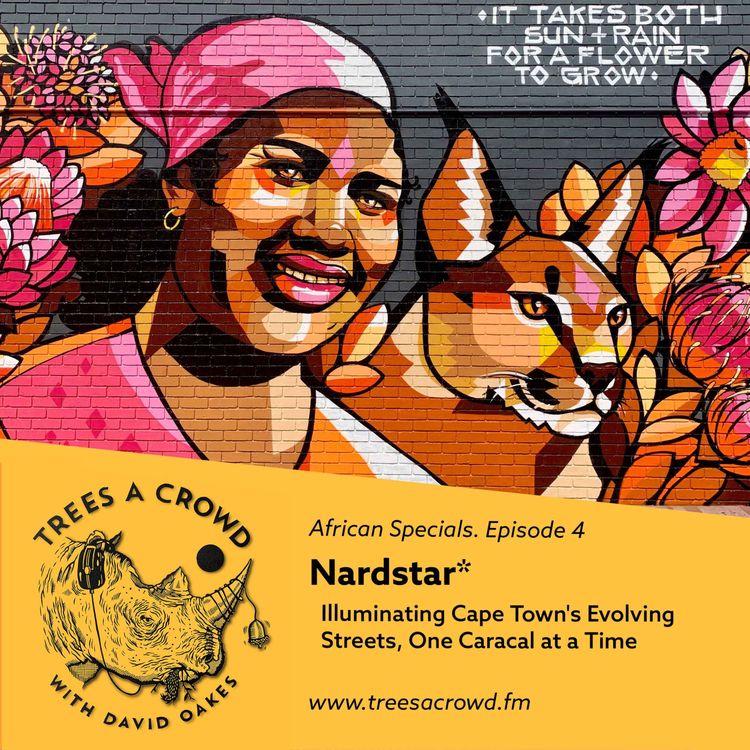
Trees A Crowd
Nardstar*: Illuminating Cape Town's Evolving Streets, One Caracal at a Time
Nardstar, the creative alias of Nadia Fisher, is a captivating wall-art and mural virtuoso hailing from the vibrant cityscape of Cape Town. Through bold lines and distinctive colour palettes she uses local flora and fauna both as a tribute to her local milieu and a catalyst for thought-provoking social discourse. Her urban landscape becomes a canvas for contemplation: How do we reclaim our city spaces? What boundaries should exist between land and ownership? Can nature's boundless beauty be a birthright for all, or is it more apt as a mirror to inner potential? Amidst these inquiries, Nardstar ingeniously interweaves the transformative power of street art with nature's resilience, fostering an empowering essence particularly strongly for women of colour.
More episodes
View all episodes
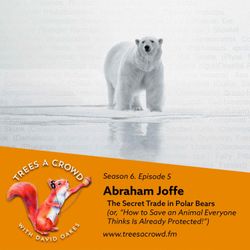
5. Abraham Joffe: The Secret Trade in Polar Bears (or, “How to Save an Animal Everyone Thinks Is Already Protected!”)
34:59||Season 6, Ep. 5In the second of two CITES-centric episodes, this episode finds David in conversation with Australian filmmaker Abraham Joffe – director of Trade Secret, the award-winning documentary exposing the global trade in polar bear skins. While climate change relentlessly erodes the sea ice these animals depend on, Abraham reveals how polar bears are still legally trophy-hunted, skinned and sold as luxury rugs and taxidermy, their fate decided in conference halls thousands of miles from the Arctic.David and Abraham explore how Trade Secret follows journalists, advocates and Arctic guides – including previous guest Iris Ho – as they investigate both legal and illegal polar bear markets, and push for the species to be “uplisted” to the highest level of CITES protection. Along the way, they discuss the blurred line between filmmaking and journalism, the ethical weight that comes with shaping a story in the edit, and the power – and limits – of a documentary to change international policy.Crucially, the conversation also turns north, to the Indigenous communities who have lived alongside polar bears for generations. Abraham reflects on the cultural and subsistence importance of traditional hunting, how little money actually reaches those communities from the luxury trade, and why giving polar bears the protection they deserve doesn’t have to mean erasing the people who share their icy home.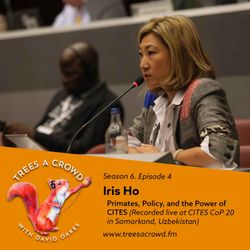
4. Iris Ho: Primates, Policy, and the Power of CITES
31:12||Season 6, Ep. 4Recorded on the outskirts of Samarkand, Uzbekistan, this episode finds David at the 20th Conference of the Parties to CITES – the global treaty that has regulated international trade in endangered species for the past 50 years. Inside, beneath flickering lights, 185 nation-states haggle over commas, clauses and quotas; at the back of the room sit conservation NGOs, animal welfare groups, trophy-hunting lobbyists, biomedical interests and import–export industries, all vying to shape the fate of the world’s wildlife.Amid this diplomatic circus, just outside the expo centre, David sits down lakeside with Iris Ho, a proudly self-professed “CITES nerd”. Born in Taiwan and now based in Washington, DC, Iris is Head of Campaigns and Policy at the Pan-African Sanctuary Alliance (PASA) – the largest network of accredited primate sanctuaries in Africa. She explains how PASA’s work caring for rescued primates on the ground connects directly to the policies debated in those halls, and why a single well-crafted decision can protect far more animals than any one sanctuary ever could.Together, they explore Iris’s efforts to up-list the golden-bellied mangabey to the highest level of CITES protection, to re-establish an international great ape enforcement task force, and the troubling case of a private “rescue centre” in India that has imported tens of thousands of wild animals under highly questionable circumstances. Along the way, Iris reflects on growing up in a Taiwan where shark fin soup went unchallenged, the quiet shift in public attitudes she’s witnessed across Asia, and how daily walks in her local DC nature reserve give her the strength to keep fighting for the natural world.It’s an episode about primates and policy, hope and heartbreak – and about why, if we truly care for the wild lives we share this planet with, we might all need to become just a little bit more “nerdy” about treaties like CITES.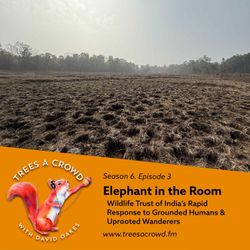
3. Elephant in the Room: Wildlife Trust of India’s Rapid Response to Grounded Humans & Uprooted Wanderers
18:49||Season 6, Ep. 3Following on from the conversation with Dr Bhaskar Choudhury in the previous episode...Recorded further south, near Bandhavgarh National Park in the Indian state of Madhya Pradesh, this bonus episode is with Amrit Menon, department head of the Wildlife Trust of India’s (WTI) Wild Aid division. This conversation looks not solely at rescue and rehabilitation, but at coexistence. What happens when wild animals are forced from their traditional habitats into states that have never before had to co-exist with them? For example, how do local farming communities adapt to life when their new neighbours are forty-five elephants strong?This conversation details the WTI’s Rapid Action Projects - RAPS — funded in part by David Shepherd Wildlife Foundation. Think of RAPS as conservation’s Thunderbirds: small, nimble teams that drop into crisis zones, offer immediate help, and try to stop future problems before they grow. We’ll then head into the field — to meet with some of the farmers facing the daily reality of elephantine visits, and the RAP project manager there on the floor, Meghna Bandyopadhyay.With thanks to David Shepherd Wildlife Foundation for making this episode possible.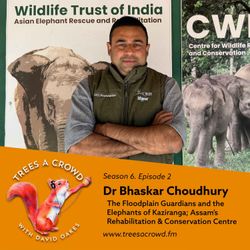
2. Dr Bhaskar Choudhury: The Floodplain Guardians and the Elephants of Kaziranga
30:01||Season 6, Ep. 2David travels to the floodplains of Assam to meet the Wildlife Trust of India’s Dr Bhaskar Choudhury, veterinarian and project head of the Centre for Wildlife Rehabilitation and Conservation (CWRC) in the heart of Kaziranga Tiger Reserve.From one-horned rhinos and swamp deer to clouded leopards and king cobras, Kaziranga’s UNESCO-protected grasslands host a breathtaking array of life – yet each monsoon, the mighty Brahmaputra River rises, displacing animals into the paths of highways, villages, and tea estates. Dr Choudhury’s team rescues the injured, the orphaned, and the lost – from palm squirrels to Asian elephants – nursing them back to the wild in what can be a ten-year journey of care, acclimatisation, and eventual release.Together, they discuss the delicate science of wildlife rehabilitation, the changing flood patterns of a climate-altered landscape, and the deep reverence with which Assam’s people greet the elephants they call gods. Along the way, Dr Choudhury reveals the quiet triumphs and heartbreaks of rewilding India’s giants — and why, after decades of work, the moment an elephant calf rejoins a wild herd still feels like a prayer answered.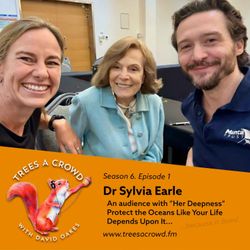
1. "Her Deepness" Dr Sylvia Earle & Dr Tessa Hempson: Protect the Oceans Like Your Life Depends Upon It... (Because It Does!)
40:14||Season 6, Ep. 1Amid the energy of the IUCN World Conservation Congress, David meets legendary marine biologist, oceanographer, and explorer Dr Sylvia A. Earle — affectionately known as “Her Deepness.” Still diving at 90, Sylvia began her career with a PhD in phycology (the study of algae) in 1966, has graced the cover of TIME magazine, authored nearly 200 scientific papers and 13 books, logged over 7,000 hours underwater, and still holds the 1979 record for the deepest solo dive — 380 meters beneath the sea.Joining her is conservation biologist Dr Tessa Hempson, Chief Scientist at Mission Blue, the nonprofit Sylvia founded in 2009. Mission Blue inspires global action to explore and protect the ocean through its network of Hope Spots — special places vital to ocean health. Partnering with local communities, scientists, and policymakers, the organization drives awareness, expeditions, and protection efforts toward one shared goal: safeguarding 30 percent of the ocean by 2030. Five years to go…Sylvia speaks of the fish she calls her friends — sentient beings with personalities, intelligence, and an inherent right to thrive in their ocean home. She reflects on the species lost to time — from the Steller’s sea cow to the dodo — their fate sealed by humanity’s destructive hand. And with a glint of curiosity, she admits her wish to meet a megalodon, that ancient giant of the deep. Yet her message is not one of nostalgia, but of hope. Sylvia believes the youth of today hold the key to a blue future — one where curiosity, courage, and compassion can restore balance to the seas she has spent a lifetime defending.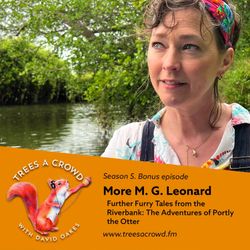
13. More M.G. Leonard: Further Furry Tales from the Riverbank
10:56||Season 5, Ep. 13Last Summer, MGL shared a very exciting secret with me. A year on, it is with no small amount of delight that I can now finally cease my silence! In Maya’s words:“I have written a book about Portly the Otter, son of Otter from The Wind in the Willows. It is modelled on Kenneth Grahame’s original, as a series of riverbank stories, and features characters we all know and love, as well as introducing you to some new ones. The book is called The Adventures of Portly the Otter - Untold Tales from The Wind in the Willows and will answer a mystery I wondered about a lot as a child, which is - what really happened to Portly for him to be missing for so long, and end up - discovered by Ratty and Moley,- curled up between the cloven hooves of the god Pan? The book is illustrated by the fabulous Polly Dunbar and will be printed as a four colour hardback gift book in March 2026 by Farshore. I cannot tell you what a joy it has been to revisit the riverbank and spend time with the much beloved Ratty, Moley, Badger, and of course the mischievous Mr Toad, but the biggest delight of all has been spending a year researching and learning about otters.”
12. M G Leonard: Storytelling and the power of Beetles! “Elytra Literature” from Shakespeare to Starship Troopers.
01:00:24||Season 5, Ep. 12A writer concerned with wondrous beetles and beautiful birds, M G Leonard and her award-winning books, for the past decade, have been inspiring the entomologists and ornithologists of tomorrow. Here, Leonard joins Oakes on the banks of the river that inspired Kenneth Grahame's "The Wind in the Willows" for an episode about how Nature and Storytelling are vitally important in inspiring young (and old) minds. In an interview that spans the arts - everything from Shakespeare to "Starship Troopers" - David and Maya discuss why badgers walk like an actor called Michael Bryant, how Ladybirds are actually Transformers, why Entomologists hate "The Hungry Caterpillar", and why beetles deserve a co-credit for authoring Darwin's "The Origin of the Species". Most importantly, hear how Maya’s journey into our natural world was far from guaranteed; in reality, it was a wild journey forged through stories, storytelling and one or two lies. Initially just a "Bug Tourist", Maya is now the Vice President for the insect charity BugLife, and manifested the world's first Masters Degree in Entomology. All that, and how to survive if you were ever to find yourself in a battle against a human-sized beetle!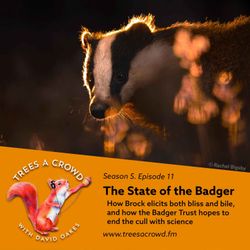
11. Dr Hannah Trayford & Rachel Bigsby: The State of the Badger, with the Badger Trust
48:09||Season 5, Ep. 11Britain and its rural communities have been obsessed with Badgers for centuries. Sometimes cast as hero, sometimes as villain, tales of their behaviour can be found woven into the fabric of our nation's folk stories. They have since been immortalised in literature by the likes of Beatrix Potter and Kenneth Grahame. Their prominence in rural life continues into our modern Britain, where Badgers find themselves in the crosshairs of an ongoing cull. But are Badgers the villain of this new tale - persecuting farmers trying to make ends meet within our complicated food chain - or are they the unfortunate scapegoat in a politically-motivated act of extreme animal cruelty? David meets up with Dr Hannah Trayford, the Badger Trust Campaigns and Research Manager, and award-winning photographer Rachel Bigsby, the Badger Trust Youth Ambassador, to understand a little more about the realities of the ongoing cull, and the (lack of) science backing it up. Is it justifiable to cull 50% of the national Badger population, when it is 800 times more likely for cattle to spread Bovine Tuberculosis to Badgers, than the other way around? And if that all sounds too dour, then fear not, for the first 20 minutes of this podcast is actually about Orang-utans and the joy of photographing sea birds!
10. Matthew Oates: A Paean to the Purple Emperor. One Man’s Passion-filled Past Devoted to Great British Butterflies
52:10||Season 5, Ep. 10Matthew Oates is a naturalist, nature writer, and poet with a lifelong passion for butterflies. In the short sward of the Cotswolds, Matthew takes David Oakes on a journey through his fluttery past. They discuss the writers who have inspired him, from Tolkien to Wordsworth and W.H. Hudson, and share stories of other notable butterfly enthusiasts, such as Sir Winston Churchill. Matthew explains his belief that true conservation is a blend of science and love. They also delve into the realities of developing a love for nature in the boarding schools of the Swinging Sixties - a time when his generation transitioned "from Molesworth to Jimi Hendrix in just three years," leaving little room for butterflies or a life-defining obsession with the intoxicating Purple Emperor. Their conversation also addresses modern concerns for butterfly conservation, including pathogens and parasites, the risks of unsanctioned releases, and the importance of single-species ecologists - “insects shout loudest and first.” Ultimately, this is a discussion about the metamorphoses of both the past and the future.